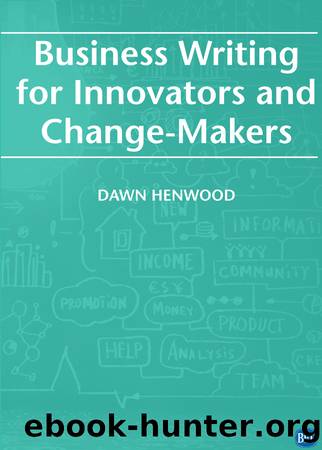Business Writing For Innovators and Change-Makers by Dawn Henwood

Author:Dawn Henwood [Dawn Henwood]
Language: eng
Format: epub
Publisher: Business Expert Press
Published: 2020-07-23T16:00:00+00:00
1. Do Your Detective Work
The kind of detective work I’m talking about involves sleuthing out power relationships among your audience. In the case of a grant application or RFP, try to find out all you can about the committee members’ vetting applications. It’s fair game to call up a charitable or government organization and ask who’s on the committee this year. If they’re reluctant to share that information, you can ask about the typical composition of the committee. For instance, the Heritage Society committee might typically comprise one or two donors, a member of City Council, the executive director of the Society (or her delegate), a contractor, and a volunteer who helps out in the Society archives.
For RFPs, the detective work can be more challenging. Read the RFP carefully so you respect the guidelines it sets out. Some RFPs encourage people to call with questions, while others forbid it. Regardless of the RFP “rules,” you can leverage your professional network. Use the grapevine to make some subtle inquiries about the organization’s expectations and the typical make-up of the review panel.
If you’re writing an informal proposal, however, you’re in luck, Sherlock. Conversations with the client should give you ample opportunity to explore questions such as these:
•Who will decide whether the proposal is a go or no-go? (This is your Decision-maker.)
•Who else will read the proposal? (These are your Secondary Readers.)
•Who else could influence the decision? (These are your Influencers, and you may find them outside and inside the organization.)
•For each stakeholder group, what outcome from the proposal will matter most to them? What will matter least to them?
•What key words will resonate with each stakeholder group?
When you’re creating an informal proposal for a client you’ve met, some of your detective work can take a direct approach. When I’m proposing writing training to a CEO, for example, I normally ask outright who else in the organization will be reading the proposal. I also ask whether there’s any specific information they’d like to see in the proposal. Most clients appreciate this question because they know it will enable me to tailor the proposal to the interests of their team, making it easier for them to review the document and make a decision.
Other aspects of proposal detective work tend to require a more indirect approach. For instance, it’s not always wise to ask Secondary Readers and Influencers what their number-one goal for the project is because some of their interests may conflict with those of other readers. Such proposal intelligence is best teased out through listening attentively, researching your audience online, and observing body language and personal interactions during meetings.
Download
This site does not store any files on its server. We only index and link to content provided by other sites. Please contact the content providers to delete copyright contents if any and email us, we'll remove relevant links or contents immediately.
Nudge - Improving Decisions about Health, Wealth, and Happiness by Thaler Sunstein(7689)
Deep Work by Cal Newport(7061)
Principles: Life and Work by Ray Dalio(6413)
The Doodle Revolution by Sunni Brown(4752)
Factfulness: Ten Reasons We're Wrong About the World – and Why Things Are Better Than You Think by Hans Rosling(4730)
Eat That Frog! by Brian Tracy(4519)
Thinking in Bets by Annie Duke(4216)
Hyperfocus by Chris Bailey(4110)
Visual Intelligence by Amy E. Herman(3775)
Writing Your Dissertation in Fifteen Minutes a Day by Joan Bolker(3715)
Ogilvy on Advertising by David Ogilvy(3599)
Hidden Persuasion: 33 psychological influence techniques in advertising by Marc Andrews & Matthijs van Leeuwen & Rick van Baaren(3550)
How to Win Friends and Influence People in the Digital Age by Dale Carnegie & Associates(3544)
How to win friends and influence people by Dale Carnegie(3468)
The Pixar Touch by David A. Price(3429)
Schaum's Quick Guide to Writing Great Short Stories by Margaret Lucke(3371)
Deep Work: Rules for Focused Success in a Distracted World by Cal Newport(3224)
Work Clean by Dan Charnas(3114)
The Slow Fix: Solve Problems, Work Smarter, and Live Better In a World Addicted to Speed by Carl Honore(3001)
